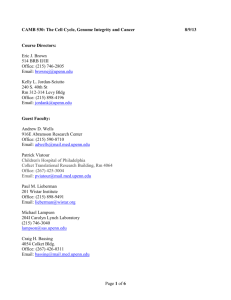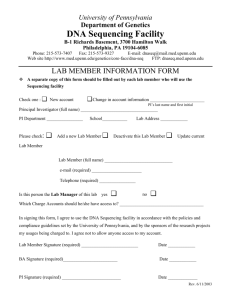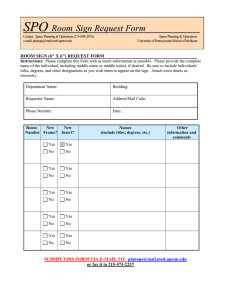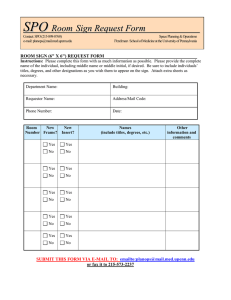Eric J. Brown 514 BRB II/III Office: (215) 746-2805
advertisement
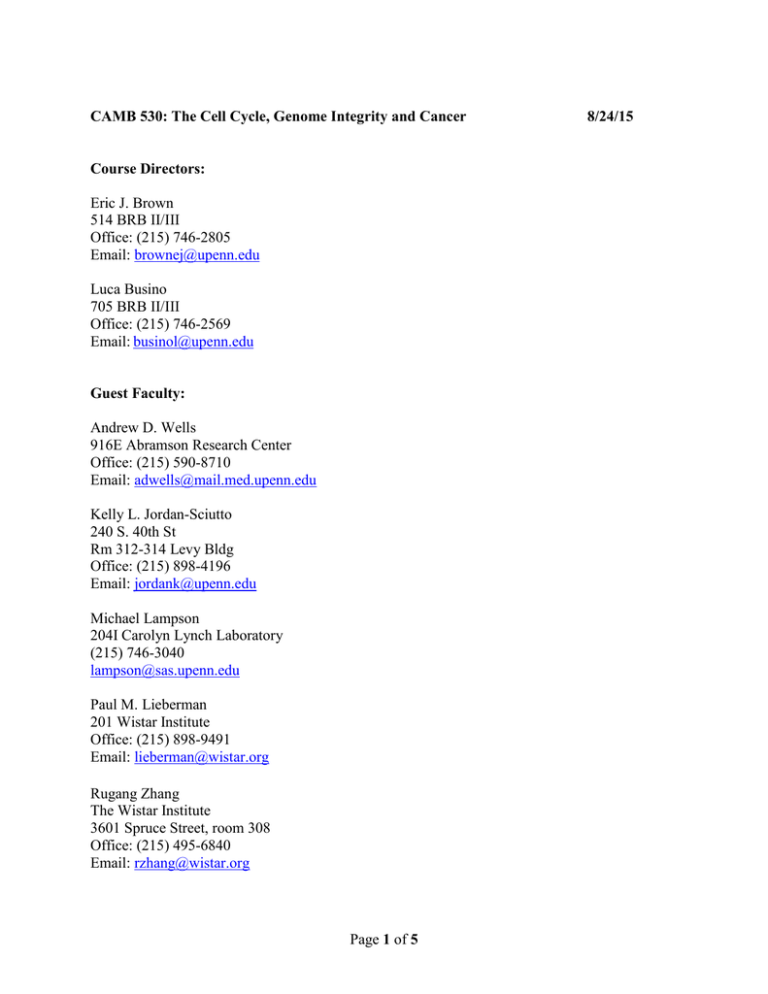
CAMB 530: The Cell Cycle, Genome Integrity and Cancer Course Directors: Eric J. Brown 514 BRB II/III Office: (215) 746-2805 Email: brownej@upenn.edu Luca Busino 705 BRB II/III Office: (215) 746-2569 Email: businol@upenn.edu Guest Faculty: Andrew D. Wells 916E Abramson Research Center Office: (215) 590-8710 Email: adwells@mail.med.upenn.edu Kelly L. Jordan-Sciutto 240 S. 40th St Rm 312-314 Levy Bldg Office: (215) 898-4196 Email: jordank@upenn.edu Michael Lampson 204I Carolyn Lynch Laboratory (215) 746-3040 lampson@sas.upenn.edu Paul M. Lieberman 201 Wistar Institute Office: (215) 898-9491 Email: lieberman@wistar.org Rugang Zhang The Wistar Institute 3601 Spruce Street, room 308 Office: (215) 495-6840 Email: rzhang@wistar.org Page 1 of 5 8/24/15 Ronen Marmorstein 454 BRB Office: (215) 898-7740 Email: marmor@mail.med.upenn.edu Craig H. Bassing 4054 Colket Translational Research Building Office: (267) 426-0311 Email: bassing@mail.med.upenn.edu Robert Faryabi 553 BRB Office: (215) 573-8220 Email: faryabi@mail.med.upenn.edu Matthew D. Weitzman 4050 Colket Translational Research Building Office: (267) 425-2068 Email: weitzmanm@email.chop.edu Andy Minn 510 BRB Office: (215) 746-2694 Email: andyminn@exchange.upenn.edu Teaching Assistant: Colleen Harrington 4300 Colket Translational Research Building Phone: (267) 426-8117 Cell (urgent issues only): (443) 844-7308 Email: coharr@mail.med.upenn.edu Course Coordinator: Laura Murillo 515 BRB Phone: (215) 573-0908 Email: murillo@exchange.upenn.edu When: Wednesdays 1:00-3:00 PM Where: 501 BRB II/III Page 2 of 5 Goals: 1) Become familiar with the major principles of how the cell cycle machinery operates and is regulated by DNA damage checkpoints, examine how these and other processes are utilized to facilitate DNA repair and govern telomere maintenance, and learn how viral mimicry can be studied to better understand these mechanisms. The ways in which perturbation of the cell cycle, DNA damage checkpoints, and repair machinery can both promote cancer and be capitalized upon for cancer treatment will be illustrated. 2) Develop and practice the key academic skills that you will need throughout your careers: critical analysis of the literature, oral presentation of scientific information, writing reviews of the literature, proposing experiments, listening actively to and digesting scientific presentations, meeting professional deadlines, and providing critical/constructive criticism. Structure: This is a seminar course, with an additional requirement for a short (review) paper. Each week one or two students will present a seminal paper in the field. The student will first present a brief history of the topic (see list of topics below) and establish why the work was done. The paper will then be analyzed, figure by figure, through student participation. A summary will be made of the important findings. Unanswered questions and directions for future work will be presented, accompanied by a class discussion. A designated faculty member (coach) will meet with the student before the presentation to offer advice and help ensure that the topic is addressed well, for the benefit of the presenter and the rest of the students. The same faculty member will attend the presentation and provide feedback. A short review of recent important papers on a topic germane to the course will be written and turned in at the end of the course. Content: The course topics are chosen to familiarize the student with the key principles, the most productive experimental systems, and the seminal studies from an exciting past twenty years of cell cycle and DNA damage/repair research. Primary literature will be used to illustrate the impact of perturbations in both cell cycle regulation and genome surveillance mechanisms on neoplastic growth. The topics will unfold by focusing on major classes of cell cycle regulatory proteins, mechanisms of their regulation, critical cell cycle transitions, and their importance for normal cell proliferation. We will subsequently consider surveillance/checkpoint mechanisms that are activated by perturbation in genome integrity and determine cell fate. Date 9/9/15 9/16/15 9/23/15 9/30/15 10/7/15 Topic Course orientation CDK/Cyclins CDK inhibitors Control of G1-S transition: RB and p53 Mitosis/spindle assembly checkpoint Page 3 of 5 Faculty coach Eric Brown and Luca Busino Luca Busino Andrew Wells Kelly Jordan-Sciutto Michael Lampson 10/14/15 10/21/15 10/28/15 11/4/15 11/11/15 11/18/15 11/25/15 12/2/15 12/9/15 12/16/15 DNA damage checkpoints Chromatin and DNA repair Oncogenic stress and the DDR Molecular basis of tumor suppressor function DDR gene loss and cancer Genome-wide assessment of DNA damage -no classDNA damage responses to viruses Secreted factor responses to DNA damage Research Proposals due Eric Brown Paul Lieberman Rugang Zhang Ronen Marmorstein Craig Bassing Robert Faryabi Matt Weitzman Andy Minn Grading: Presentation Oral participation Problem sets Research Proposal 25% 25% 25% 25% Presentation: a) Copies of all papers for presentation will be available on Canvas. Once the enrollment is finalized, students will be assigned presentation topics covering the rest of the course. If the date confers an unusual hardship, you may ask the directors to switch. Presentations should be in the form of a PowerPoint presentation. b) We will supply you with a short list of suggested references and reviews for each topic by the 2nd class meeting. Focus the presentation on one or two (related) papers depending upon topic. If you would like to present a paper that is not on the list, please get approval in advance from the faculty coach. With the exception of the second meeting, you must choose your paper no less than three weeks before your presentation date to provide time for guest lectures to design the problem set and work with you on your topic. In addition, your fellow students will then have ample opportunity to read and evaluate the chosen paper. c) You can talk to us at any point as you choose your paper or try to understand the paper. However, your final discussion with us should be no later than Friday prior to your presentation date, at a mutually agreed upon time. You should have your talk and slides (PowerPoint) prepared prior to going into this meeting. The more you prepare beforehand, the more we can help you and ensure good coverage of the field for the class. d) Students will anonymously evaluate each presentation. This feedback will be given directly to the presenter and will not be used in grading. On the day you present, you are to stay after class and meet with the assigned faculty member for feedback. We encourage students to make a handout for the class on their presentation topic. Page 4 of 5 Participation Oral participation (25%): We seek to foster a supportive atmosphere in the class while maintaining scientific rigor, keeping people engaged, and learning as much as possible. Asking questions and making comments helps the presenter know if he/she is getting through. In addition, listening actively, assimilating scientific material, and asking questions that clarify or stimulate thought are useful scientific skills that can be honed by practice. There are no bad questions at this stage of your careers and admitting some ignorance is better in the long run. If you are unsure about something, chances are others are as well. To underscore these notions, we include participation as a significant part of the final grade. Students are expected to read each paper carefully in advance of the class. Everyone is expected to actively participate in the discussion each week; in other words, you should come prepared to ask questions, both philosophical and technical, each week. Grades will ultimately reflect your level of engagement each week. Active listening, assimilation of scientific material, and asking questions that clarify or stimulate thought are useful scientific skills that can be honed by practice. Problem Sets (25%): To facilitate discussion and a more thorough understanding of the material presented in the weekly paper, students will be provided with 3-5 questions by the faculty coach/moderator, 1 week before the paper is presented/discussed. Students are expected to provide written answers (short answer) to be handed in for a grade. However, students are encouraged to use these questions (and their preferred answer) as a point of discussion when the papers are presented. In other words, the extra work here will facilitate better participation and contribute to oral participation! Research Proposals (25%): Each student will develop a research plan to investigate an unanswered question that overlaps with one or more of the areas described in this course. Students will be expected to identify this novel research question and propose how it will be answered experimentally. A two page description of the proposal will be due after the final week of the course. This proposal should include 1) a title, 2) the question to be answered, 3) a rationale of why the question is novel and significant, 4) a hypothesis, and 5) a detailed experiment approach in the form of specific aims to address the research question. Students are encouraged to synthesize new perspectives from the diverse topics covered in the course and reveal underdeveloped research areas. Experimental methods described in the course and/or novel ones should be used to explore this new research area in the most definitive manner possible. Finally, the results that are expected to be observed if the hypothesis is correct should be described, and alternative outcomes and subsequent alternative hypotheses/models should be included. The goal should not be to write a grant proposal, but rather engage in a creative mission to identify an interesting/novel research area and develop an experimental approach with critical foresight to investigate it. Due date: Wednesday, December 16th Page 5 of 5
